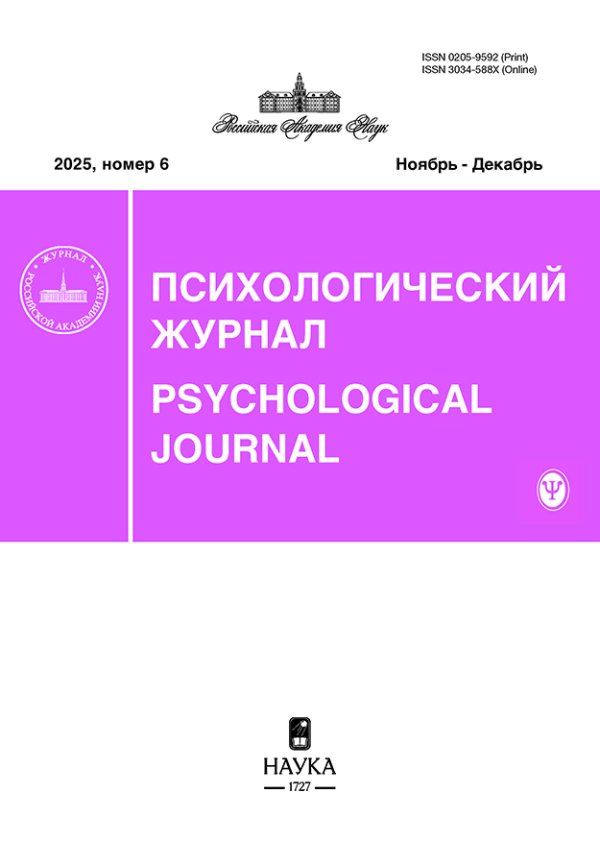Social pressure as a stimulus context for moral behavior
- Authors: Fedorov A.A.1
-
Affiliations:
- Novosibirsk State University
- Issue: Vol 46, No 2 (2025)
- Pages: 47-59
- Section: Social psychology
- URL: https://journal-vniispk.ru/0205-9592/article/view/294990
- DOI: https://doi.org/10.31857/S0205959225020052
- ID: 294990
Cite item
Abstract
The article presents the results of a study on social pressure as a stimulus context for moral behavior. Three experiments examined how external and internal social pressure, relative to the scenario of a moral dilemma, affects the evaluation of moral actions. The total number of participants was 565, with 127 in the first study, 152 — in the second study and 286 in the third one. The samples did not overlap. In the first and the second experiments, external pressure was applied by informing participants about the percentage of people who responded to the dilemmas in a particular way in a previous study, whereas internal pressure involved indicating in the text of the dilemma the solution preferred by the character’s social environment. The results show that external pressure can shift moral evaluations toward social influence, whereas internal pressure does not significantly affect participants’ choices. In the third experiment, the study investigated how information about the conformity or nonconformity of the character’s action in the moral dilemma affects its moral assessment. According to the results, participants relied on general moral rules in their evaluations, and information about the conformity or nonconformity of the character’s actions did not affect their judgments. The article discusses the findings in the context of a behaviorist approach that treats moral behavior as rule-governed. The hypothesis of the illusion of moral autonomy is proposed, describing a tendency to evaluate the moral behavior of others based on universal moral rules, while ignoring situational context.
Full Text
About the authors
A. A. Fedorov
Novosibirsk State University
Author for correspondence.
Email: fedleks@yandex.ru
PhD (Psychology), Associate Professor, Head of the Section of Clinical Psychology
Russian Federation, 630090, Pirogov str., 1, NovosibirskReferences
- Locke J. Opyt o chelovecheskom razumenii // Sochinenija v 3-h V. V. 1. Moscow: Mysl’, 1985. (In Russian).
- Fedorov A.A. Povtorenie kak stadija issledovatel’skogo processa. Psihologicheskoe znanie: stadii issledovatel’skogo processa. Eds. A.L. Zhuravlev, D.V. Ushakov, A. V. Yurevich. Moscow: Izd-vo “Institut psihologii RAN”, 2023. P. 106–138. (In Russian).
- Fedorov A.A. An experimental analysis of moral conformity in a situation of passive social pressure. Psychology, Journal of the Higher School of Economics. 2024. V. 1. №. 2. P. 277–305. (In Russian).
- Fedorov A.A., Rakhmanov A.S. Moral conformity under different forms of virtual pressure. Experimental Psychology (Russia). 2024. V. 17. № 1. P. 118–130. (In Russian).
- Bocian K., Gonidis L., Everett J.A.C. Moral conformity in a digital world: Human and nonhuman agents as a source of social pressure for judgments of moral character. PLOS ONE. 2024. V. 19. № 2. P. e0298293.
- Bostyn D.H., Roets A. An asymmetric moral conformity effect: Subjects conform to deontological but not consequentialist majorities. Social Psychological and Personality Science. 2017. V. 8. № 3. P. 323–330.
- Capuano C., Chekroun P. A systematic review of research on conformity. International Review of Social Psychology. 2024. V. 37. № 1.
- Ellemers N., Toorn J. van der, Paunov Y., Leeuwen T. van. The psychology of morality: a review and analysis of empirical studies published from 1940 through 2017. Personality and Social Psychology Review. 2019. V. 23. № 4. P. 332–366.
- Endler N.S. Conformity as a function of different reinforcement schedules. Journal of Personality and Social Psychology. 1966. V. 4. № 2. P. 175–180.
- Funder D.C. Towards a resolution of the personality triad: Persons, situations, and behaviors. Journal of Research in Personality. 2006. V. 40. № 1. P. 21–34.
- Furr R.M., Funder D.C. Persons, situations, and person–situation interactions. In Handook of personality: Theory and research. Eds. O.P. John, R.W. Robins. New York: The Guilford Press, 2021. P. 667–685.
- Guerin B. Social facilitation. Paris: Editions de la Maison des Sciences de l’Homme, 1993.
- Hogan R. Much ado about nothing: The person–situation debate. Journal of Research in Personality. 2009. V. 43. № 2. P. 249.
- Jones E.E., Harris V.A. The attribution of attitudes. Journal of Experimental Social Psychology. 1967. V. 3. № 1. P. 1–24.
- Kelly M., Ngo L., Chituc V., Huettel S., Sinnott-Armstrong W. Moral conformity in online interactions: rational justifications increase influence of peer opinions on moral judgments. Social Influence. 2017. V. 12. № 2–3. P. 57–68.
- Klucharev V., Hytönen K., Rijpkema M., Smidts A., Fernández G. Reinforcement learning signal predicts social conformity. Neuron. 2009. V.61. № 1. P. 140–151.
- Kundu P., Cummins D.D. Morality and conformity: The Asch paradigm applied to moral decisions. Social Influence. 2013. V. 8. № 4. P. 268–279.
- Kurtines W.M. Moral behavior as rule governed behavior: Person and situation effects on moral decision making. Journal of Personality and Social Psychology. 1986. V. 50. № 4. P. 784–791.
- Lisciandra C., Postma-Nilsenová M., Colombo M. Conformorality. A study on group conditioning of normative judgment. Review of Philosophy and Psychology. 2013. V. 4. № 4. P. 751–764.
- Locke J. An essay concerning human understanding. London: Thomas Tegg, 1828.
- Malle B.F. The actor-observer asymmetry in attribution: A (surprising) meta-analysis. Psychological Bulletin. 2006. V. 132. № 6. P. 895–919.
- Marton-Alper I.Z., Sobeh A., Shamay-Tsoory S.G. The effects of individual moral inclinations on group moral conformity. Current Research in Behavioral Sciences. 2022. V. 3. P. 100078.
- Michael J. Distinguishing between discriminative and motivational functions of stimuli. Journal of the Experimental Analysis of Behavior. 1982. V. 37. № 1. P. 149–155.
- Paruzel-Czachura M., Wojciechowska D., Bostyn D. Online moral conformity: How powerful is a group of strangers when influencing an individual’s moral judgments during a video meeting? Current Psychology. 2023. P. 1–11.
- Peláez M. Morality as a system of rule-governed behavior and empathy. Behavioral Development Bulletin. 2001. V. 10. № 1. P. 8–14.
- Skinner B.F. An operant analysis of problem solving. In Problem solving: Research, method and theory. Ed. B. Kleinmuntz. New York: John Wiley, 1966. P. 225–257.
- Theriault J.E., Young L., Barrett L.F. The sense of should: A biologically-based framework for modeling social pressure. Physics of Life Reviews. 2021. V. 36. P. 100–136.
- Weatherly J., Miller K., McDonald T. Social influence as stimulus control. Behavior and Social Issues. 1999. V. 9. P. 25–45.
Supplementary files












